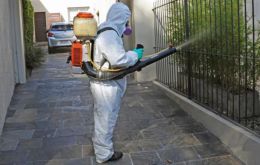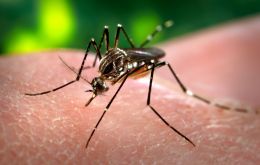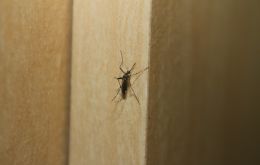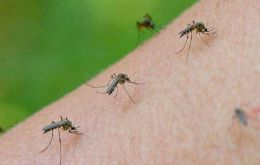MercoPress. South Atlantic News Agency
Tag: dengue
-
Tuesday, March 26th 2024 - 10:53 UTC
Mosquitoes invading Montevideo, not the ones carrying dengue

Uruguay's Health Ministry (MSP) Zoonosis and Vectors Director Gabriela Willat said Monday that “they are the flood mosquitoes, which breed in puddles and hatch at the same time.” She made those remarks as the number of dengue cases is soaring in neighboring Argentina and Brazil while an increase is expected locally following the current Tourism Week holiday, the country's lay version of the Easter Week recess.
-
Tuesday, March 26th 2024 - 10:49 UTC
Argentina not using dengue vax for now despite soaring number of cases

Health Ministers from Argentina's 24 districts (23 provinces plus the Autonomous City of Buenos Aires -CABA-) convened Monday with their federal government colleague, Mario Russo, to review the situation of dengue fever nationwide and agreed to review the use of the Japanese-developed Qdenga vaccine next year.
-
Wednesday, March 20th 2024 - 08:06 UTC
Uruguay: President Lacalle announces first dengue-caused death

President Luis Lacalle Pou Tuesday confirmed Uruguay's first fatality due to dengue fever in 2024 following a Health Ministry (MSP) report that a possible case was under investigation. The head of state will meet Wednesday with Health Minister Karina Rando at the Suarez y Reyes residency to review possible courses of action with the malady as a priority.
-
Tuesday, March 19th 2024 - 10:44 UTC
Cases of dengue soar in Argentina

Argentina's medical facilities have been reporting an increasing number of patients with dengue-fever-like symptoms over the past few days as authorities say that over 120,000 positive cases and 79 deaths have been confirmed in the last eight months. Nevertheless, the government of President Javier Milei will not follow up on Brazil's model and no action will be taken for the State to afford a mandatory and free-of-charge vaccination campaign.
-
Tuesday, March 5th 2024 - 10:49 UTC
Second case of local dengue reported in Uruguay

Uruguayan health authorities confirmed Monday the second case of autochthonous dengue in the country, it was reported in Montevideo.
-
Saturday, March 2nd 2024 - 10:28 UTC
First case of autochthonous dengue reported in Uruguay

Uruguay's Health Ministry confirmed Friday the first case of autochthonous dengue in the country. There are currently 32 confirmed cases of imported infections, according to Montevideo outlets. The last autochthonous case in Uruguay dates back to 2020 and only three detections were registered in the country in the past four years.
-
Friday, March 1st 2024 - 09:49 UTC
Brazil surpasses 1 million probable cases of dengue this year

Brazil has recorded 1,017,278 probable cases of dengue and 214 confirmed deaths from the disease so far this year, Agencia Brasil reported Thursday. Another 687 fatalities are under investigation.
-
Wednesday, February 28th 2024 - 10:51 UTC
Almost all of Peru under dengue health emergency

Peruvian authorities declared a state of health emergency in 20 of the country's 25 regions due to an outbreak of dengue fever. ”Tomorrow 20 regions of the country will be declared in sanitary emergency for a period of 90 days due to (the cases of) dengue,” Prime Minister Alberto Otárola announced. The state of health emergency allows the authorities to grant a larger budget to combat the disease, among other measures.
-
Wednesday, February 21st 2024 - 08:58 UTC
Argentina: Alberto Fernández partly to blame for dengue crisis, Spokesman Adorni says

Argentine Presidential Spokesman Manuel Adorni Tuesday blamed the administration of Alberto Fernández (2019-2023) for “much of the problem” stemming from a spread of dengue fever in the Buenos Aires Metropolitan Area (AMBA). Adorni spoke of a “failure” in public policies under the previous government regarding the current mosquito invasion.
-
Tuesday, February 20th 2024 - 10:27 UTC
Buenos Aires under heavy mosquito invasion

In Argentina, the City and Province of Buenos Aires are going through a “peak of abundance” of the Aedes albifasciatus mosquito, which has led specialists to recommend the citizenry to up all preventive measures and use repellents, mosquito nets, and wear long-sleeve clothing. These insects are said to be behind the spread of the Western Equine Encephalitis virus (WEE).
